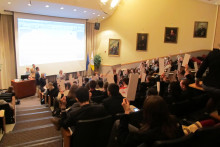Denys was one of approximately two hundred students from European and American universities attending the annual conference. They spend four days discussing a proposal on cyber-security policy. Each student was given an alter ego; for instance, Denys was David Cameron and Lisa Schneider, second-year student, was European Parliament Chair, Martin Schulz.
Raised eyebrows
‘The amazing thing is that you quickly find yourself in a sort of flow. You actually feel you are a head of government’, says Denys. ‘For instance, between meetings I would read an article about more EU integration. This immediately caused me, in my role as David Cameron, to raise my eyebrows, because Great Britain is opposed to this. It also involved a lot of speeches.’
Denys received the prize for best head of government for his performance as David Cameron. Marie Helen Ferdelman, second-year student, who played the Spanish European Union MP Juan Fernando López Aguilar, was also awarded a prize.
Complicated subject
EuroSim, a trans-Atlantic collaboration between twenty universities, took place at the UT last year. This year it was the turn of Skidmore College in Saragota Springs, NY, and the subject was cyber-security. ‘This subject is very topical and remarkable, because there is so little legislation on the matter’, says Denys. ‘Internet has developed rapidly, which is what makes its security a very complicated subject.’
During the meetings, the students discussed the possibilities of an institute in each EU country in order to realize unilateral legislation for cyber-security. In addition Denys was involved in other tasks that David Cameron has to fulfil (in the European Council), such as collaborations in this field with the African Union and Russia.
Difficult game
Denys says this provided him with good insight into European decision-making which, according to him, looks difficult. ‘We played according to the official European rules. I now understand much better how it works, how difficult the whole political game is. For instance, everyone in the European Council can proclaim a veto and a proposal has to be amended. One person wants this, another wants that; this is what results in vague statements. When you find yourself right in the middle of such a process, you realize why it is in fact so difficult.’







